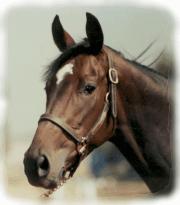A Horse, of Course with Don Blazer |
If you enjoy learning about horses, then you'll love our online courses. Each month you'll find a new column on our web site. We hope you'll enjoy it, and maybe e-mail us with questions or suggestions for other columns. A Horse, Of Course is a monthly column syndicated by Success Is Easy. If you like the column, call your local newspaper, or local horse publication and ask them to subscribe by contacting Success Is Easy. |
Nutrition for the Equine Hoof Don Blazer copyright©2014 |

Feeding that bran mash may
be a danger to the health of your horse’s hoof. And biotin supplements aren’t going to help. If you want your horse to have a healthy hoof, you’ve got to feed his feet. Good nutrition pays off in a healthy hoof. Do not feed bran if your horse has any hoof problems. Oats or other grain brans contain phytate which is high in phosphorus and will block absorption of calcium in the small intestine, producing a systemic calcium deficiency, according to J. Frank Gravlee, DVM, MS. Dr. Gravlee is an equine veterinarian and founder of Life Data Labs in Cherokee, Alabama. Calcium, Dr. Gravlee says, is necessary for the strong bonding of keratinized cells to produce a strong hoof. Dr. Gravlee says if you are feeding bran to regulate stool consistency switch to sugar beet pulp. If you are using bran to prevent sand colic, use psyllium instead, he says. (Personally, I say feed the horse adequate amounts of forage and he won’t be sifting through dirt and sand looking for that last blade of grass. Your horse should have a handful of hay left at the time of his next feeding.) Biotin, the popular “hoof growth supplement”, is only one of many nutrients needed for a health hoof, and biotin is only needed in small amounts. Dr. Gravlee points to studies which clearly show a horse with a normally functioning GI tract has no biotin supplement need. Research has also shown that feeding more than the physiological amount of biotin does not improve hoof growth and strength, he says. What you do need to feed is loose salt, vitamin C, copper and zinc, says Dr. Gravlee. Be sure your horse has access to loose salt. Salt blocks are fine for cattle, but a horse has a smooth tongue and cannot lick adequate amounts of salt. Do not depend on a salt block. Horses fed a premixed feed often get adequate amounts of salt, so if fed loose salt, they may ignore it. Copper and vitamin C, according to Dr. Gravlee, are necessary catalysts for forming health, connective hoof tissue and should be provided through the daily diet or supplemented. Check your feeding program to be sure copper and vitamin are provided in adequate amounts. DL-methionine, praline, glycine and glutamic acid are major building blocks for healthy connective tissues. Zinc is a requirement for a health hoof. Without the proper amount of zinc, the hoof suffers parakaratosis, a defect in the maturation of keratin, which leaves the hoof soft and structurally weak. Dr. Gravlee cautions that the proper amount of zinc must be in the proper ratio with cooper. Do not start feeding supplements just as an “insurance policy.” If you do not know for certain that you have a dietary deficiency, do not supplement. And no horse should be given more than one supplement at a time. Feeding multiple supplements leaves you with no baseline and no way to determine the effectiveness of supplementation. In addition, multiple supplements can create “combination” problems. Finally, essential fatty acids are necessary for the creation of a healthy pliable hoof. Fatty acids are obtained from grains, unprocessed grain oils, cooked whole soybeans and lecithin. |